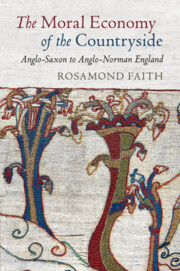Book contents
- Reviews
- The Moral Economy of the Countryside
- The Moral Economy of the Countryside
- Copyright page
- Contents
- Preface
- Abbreviations
- 1 Introduction: The Moral Economy
- Part I Rank
- Part II Reciprocity
- 5 Hospitality
- 6 Hearth, Household, and Farm
- Part III Reputation and Witness
- Part IV The Wolf Sniffs the Wind
- Part V The Aftermath of Conquest
- Part VI In the World of the Manor
- Appendix The Family Farm in Peasant Studies
- Bibliography
- Index
6 - Hearth, Household, and Farm
from Part II - Reciprocity
Published online by Cambridge University Press: 25 October 2019
- Reviews
- The Moral Economy of the Countryside
- The Moral Economy of the Countryside
- Copyright page
- Contents
- Preface
- Abbreviations
- 1 Introduction: The Moral Economy
- Part I Rank
- Part II Reciprocity
- 5 Hospitality
- 6 Hearth, Household, and Farm
- Part III Reputation and Witness
- Part IV The Wolf Sniffs the Wind
- Part V The Aftermath of Conquest
- Part VI In the World of the Manor
- Appendix The Family Farm in Peasant Studies
- Bibliography
- Index
Summary
This chapter argues that reciprocity was built into the moral economy of the family farm. It is central to the moral economy of the peasant household that its members constitute the labour force for the farm. Without the produce of the farm the household would starve, without the work of the household the farm could not produce food. Households of all kinds centred on hearths. Having a hearth of one’s own was a crucial signifier of status: to be ‘hearth-fast’ entitled a person, however poor, to a place in the public world and subject to its obligations. The hearth, with its fire alight, was long taken to symbolise the ownership of land and to bring entitlement to a share in one of the most valuable resources of a rural community: rights to pasture and the family farm was the basis of the measuring unit the ‘hide’. The domestic economy had its own hierarchy in which a lord is a hlaford a ‘loaf-keeper’, a lady a hlædige , a ‘loaf-kneader’and to be someone’s ‘loaf-eater’ was to be their dependant, but one with an entitlement to protection: such people were the ‘boarders’, the bordarii , of Domesday Book. Passing on the farm within the family was as vital to peasant society as inheriting family land was to the elite.
Keywords
- Type
- Chapter
- Information
- The Moral Economy of the CountrysideAnglo-Saxon to Anglo-Norman England, pp. 58 - 76Publisher: Cambridge University PressPrint publication year: 2019

